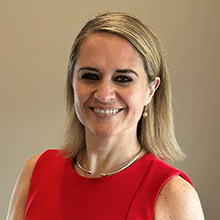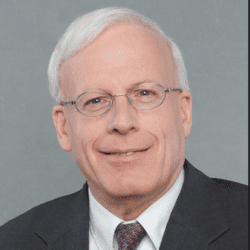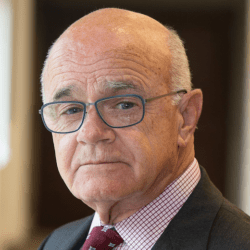Core Requirements:
MOL 610: Becoming a Leader
Today’s organizational leaders are called upon to lead through example, champion a compelling vision, search for new opportunities, and empower others to succeed, all while navigating a complex and uncertain environment. This course will introduce students to these leadership challenges through the context of four core leadership competencies—professional mastery, adaptive leadership, systemic practice, and reflective thinking. Against this backdrop, students will explore various roles of leadership while developing a deeper understanding of their skills, styles, and development needs. Three credits. No prerequisites.
MBA 601: Organizational Behavior – Leading Teams and Organizations
This course presents organizational behavior theories essential to effective management and leadership. It is designed to familiarize students with foundational knowledge of human behavior, group dynamics, and organizational systems. It examines how the application of these theories can improve performance at the individual, group, and organizational levels. There is special emphasis placed on how to select and retain talent, build strong teams, and create outstanding work environments. Three credits. No prerequisites.
MOL 613: Leading and Navigating Change and Innovation
Leaders increasingly need to understand not only how to implement and manage change inside an organization, but also how to navigate and respond to significant innovation and change occurring outside the organization. Through well-researched models and theories, this course will take a leadership perspective on how to drive and navigate change and innovation. This course gives special attention to the human dimension of change and innovation. Three credits. Prerequisite: MOL 610
MOL 615: Leader as Communicator
The work of the organization is carried out through conversation and communication, but simple models of communication are not adequate in explaining the dynamics and complexity of this human interaction. This course addresses this complexity and how communication can be used to move an organization towards a preferred future. This course will address contemporary communication challenges facing the organization such as workplace diversity, globalization, and technological developments. This course will examines how a leader’s awareness and appreciation of communication helps create, sustain, and change the direction of the organization. Three credits. Prerequisites: None.
MOL 617: Developing the Organization
Highly performing organizations require leaders to constantly improve both organizational processes and people. This course will provide students with an organizational development approach to this challenge. Students will learn a full range of organizational development tools and methods which can be utilized to solve organizational problems, improve organizational processes, and develop individual workers and managers. In addition, students will learn an organizational consulting process to diagnose, develop, and implement organizational interventions. Three credits. Prerequisites: MOL 610 & MBA 601.
MBA 770: Ethical Leadership
The purpose of this course is to critically examine and reflect on the ethical dimensions of decision making and performing the leadership role in organizations. Within this course, students use readings, their own experiences, and current events to examine actions leaders have taken and consequences faced when confronted with ethical dilemmas. Real-life ethical dilemmas will be used to enhance in-depth reasoning of the problem situation, and develop an action plan for solving and preventing similar problems at the organizational and societal levels. Key concepts include: cycle/process/criteria for analyzing and solving ethical dilemmas; approaches to ethical thinking and decision making; organizational ethics (people, culture, policies); social responsibility and the stakeholder approach; and common ethical dilemmas in specific settings/circumstances. Three credits. Prerequisites: None.
MOL 801: Leadership Capstone
This capstone course is a culminating experience that has students engaging with an organization to analyze issues and apply the competencies developed in this program to create a plan of leadership action. The project deliverable will be a report and presentation that clarifies critical strategic and leadership considerations. Ths project demonstrate students’ professional competencies and provide evidence of theoretical knowledge applied to “real-world” issues. Three credits. Prerequisites: all core courses (MOL 610, MBA 601, MOL 613, MOL 615, MOL 617, and MBA 770) plus one elective.
Initial Electives:
MBA 710: Business & Society
This course explores the increasing impact of environmental events on the managerial decision-making process. Selected phenomena such as technology, inflation, energy, the changing international order, and governmental regulation are examined for impact on total organizational strategy formulation, implementation and control. It also investigates the changing relationships among management and other organizational stakeholders using the case method to develop analytic and action-oriented skills. Three credits; Prerequisite: MBA 601.
MBA 739: Negotiation & Conflict Resolution
This course is designed to assist the developing business professionals to learn negotiation theory and practice; to develop negotiation capabilities that include conflict resolution and peacemaking in both business and social settings; and to examine the skill sets required for business professionals to manage people and process programs in today’s complex multinational business settings. Three credits; No prerequisites.
MBA 743: Leadership
This course is structured to provide any MBA student a comprehensive view of leadership in business and society. It covers a variety of leadership paradigms, theories, and approaches. The overriding aim for the course is to create a “learning laboratory” for students that contain opportunities to understand their own approaches and styles to leadership as they relate to the theory and various applications. The course allows for exploration of related issues to leadership and utilizes group exercises and simulations, self-evaluations and teamwork. Three credits; Prerequisite: MBA 601
MOL 785: Contemporary Issues in Leadership: A Case Approach
This course will use a case analysis approach to present current and relevant topics in today’s business environment. For each topic, students will engage in discussion and debate with peers, as well as analyze business cases using a framework that includes identification of key issues, exploration of research options, and development of supported solutions and recommendations. Three credits; Prerequisites: MOL 610 & MBA 601.
MOL 786: The Leadership Lab
This course provides an experiential approach to exploring leadership issues and challenges. Through case studies, guest speakers, and simulations, students will engage with leaders and leadership situations. Through this experience, students will be able to reflect and assess their development as a leader. Readings, discussion, and case studies will help prepare students for their learning experiences. Three credits. Prerequisites: MOL 610 & MBA 601.
Professional Coaching Certificate Course Descriptions:
MOL 780: Foundations of Professional Coaching
Coaching is widely recognized as a valuable resource for anyone seeking to bring out the best in others. This course covers the theoretical and practical foundations of effective coaching, whether students are adding coaching to their current leadership repertoire or developing a career in professional coaching. This course explores coaching’s theoretical roots in related fields such as humanistic psychology, human learning and change, adult development, and positive psychology. Through case studies, class discussions, and written work, you will learn to use relevant theory to ground and inform practice across a variety of coaching situations and contexts. You will develop a solid understanding of the core coaching competencies recognized by the International Coach Federation as underlying professional and ethical practice. Three credits; No Prerequisites.
MOL 781: Workplace Coaching
Organizations are increasingly seeking to use coaching in ways that enable them to cope more effectively with change and uncertainty, while developing leadership capacity, self-efficacy, and performance. This course examines coaching theory and practice in the context of organizational systems. Students will explore the use of coaching as a tool for navigating cultural and organizational change, as a leadership development strategy, and as a set of skills and practices that can be taught and embedded in organizational leaders. Through readings, case studies, class discussions, and written work, students will come to understand the common phases of organizational coaching engagements and delve deeply into the theories and best practices that inform them. Three credits; No Prerequisites.
MOL 782: Coaching Practice and Supervision I
This course offers live coaching practice and small group supervision in the classroom. During practice sessions, students will practice applying coaching knowledge and skills in a safe, supervised learning environment, where they will receive feedback and instruction in real time. During separate small group supervision meetings, students will present issues, challenges, and/or questions that arise in coaching experiences both inside and outside of the classroom. Students will engage with peers in a collaborative discussion of the emergent learning opportunities these cases represent. This course emphasizes the interrelationship of theory and ethical practice. Two credits; Prerequisites: must be taken in conjunction with MOL 780.
MOL 783: Coaching Practice and Supervision II
This is a continuation of MOL 782 Coaching Practice and Supervision I. It offers live coaching practice and small group supervision in the classroom. Students will practice applying their coaching knowledge and skills in a safe, supervised learning environment, where they will receive expert feedback and instruction in real time. During separate small group supervision meetings, students will present issues, challenges, and/or questions that arise in coaching experiences both inside and outside of the classroom. Students will engage with peers in a collaborative discussion of the emergent learning opportunities these cases represent. This course emphasizes the interrelationship of theory and ethical practice. Two credits; Prerequisites: must be taken in conjunction with MOL 781.












